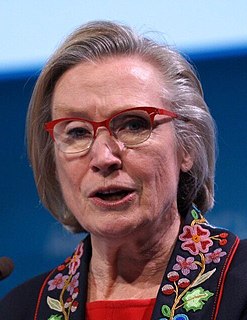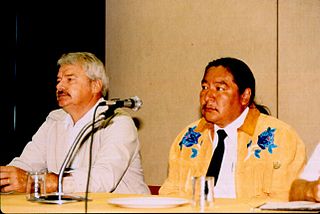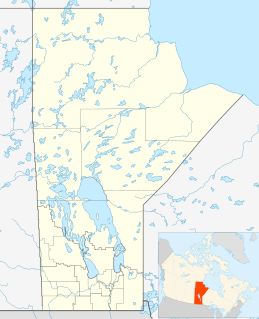
Winnipeg is the capital and largest city of the province of Manitoba in Canada. It is centred on the confluence of the Red and Assiniboine rivers, near the longitudinal centre of North America.

The Minister of Crown–Indigenous Relations is one of two Canadian cabinet ministers who administer Crown-Indigenous Relations and Northern Affairs Canada (CIRNAC), which is responsible for administering the Indian Act and other legislation dealing with "Indians and lands reserved for the Indians" under subsection 91(24) of the Constitution Act, 1867. The minister is also more broadly responsible for overall relations between the federal government and First Nations, Métis, and Inuit. The current version of the position was created alongside the Minister of Indigenous Services when Prime Minister Justin Trudeau announced on August 28, 2017 that the federal government intended to abolish the Indigenous and Northern Affairs Canada department.

Elijah Harper was a Canadian politician and Chief of his Red Sucker Lake community. He was a key player in the rejection of the Meech Lake Accord, an attempt at Canadian constitutional reform.

Glen R. Murray is a Canadian politician and urban issues advocate. He served as the 41st Mayor of Winnipeg, Manitoba from 1998 to 2004, and was the first openly gay mayor of a large North American city. He subsequently moved to Toronto, Ontario, and was elected to the Legislative Assembly of Ontario as a Liberal Member of Provincial Parliament (MPP) for Toronto Centre in 2010, serving until 2017.
Rey D. Pagtakhan, is a Canadian physician, professor and politician. He was a cabinet minister in the governments of Jean Chrétien and Paul Martin, and served as a member of parliament from 1988 until his defeat in the 2004 election.
Eric Robinson is an Aboriginal politician in Manitoba, Canada. He was previously a member of the Manitoba legislature, and a cabinet minister in the New Democratic government of Greg Selinger.

Gregory Francis "Greg" Selinger is a Canadian former politician who served as the 21st Premier of Manitoba from 2009 until 2016, leading an NDP government. From 1999 to 2009 he was the Minister of Finance in the government of his immediate predecessor, Gary Doer. Selinger was the member of the Legislative Assembly of Manitoba for St. Boniface from 1999 until his resignation in early 2018. His party was defeated by Brian Pallister and the Progressive Conservatives in the 2016 Manitoba general election.
Leonard Salusbury Evans was a Canadian politician in Manitoba. He was a member of the Manitoba legislature from 1969 to 1999 and was a Cabinet Minister in the governments of New Democratic Premiers Edward Schreyer and Howard Pawley.
John Morris Duncan, PC, MP, is a Canadian politician. He served as a Member of the Parliament of Canada from 1993 to January 2006 and again from October 2008 until August 2015. On August 6, 2010, he was appointed to the Canadian Cabinet as Minister of Aboriginal Affairs and Northern Development, Federal Interlocutor for Métis and Non-Status Indians, and Minister responsible for the Canadian Northern Economic Development Agency until his resignation on February 15, 2013 over his inappropriate written communication to the Tax Court of Canada. He later returned to Cabinet as Chief Government Whip, and served in that capacity until the 2015 election, which saw both Duncan's own defeat and the defeat of the government.
Eugene Michael Kostyra was a Canadian politician in Manitoba. He was a member of the Legislative Assembly of Manitoba from 1981 to 1988 and a cabinet minister in the New Democratic Party government of Howard Pawley.
The Congress of Aboriginal Peoples (CAP), founded in 1971, is a national Canadian aboriginal organization, that represents Aboriginal peoples who live off Indian reserves, in either urban or rural areas across Canada. As of 2011, over 70% of Aboriginal people live off-reserve.
The Kelowna Accord is a series of agreements between the Government of Canada, First Ministers of the Provinces, Territorial Leaders, and the leaders of five national Aboriginal organizations in Canada. The accord sought to improve the education, employment, and living conditions for Aboriginal peoples through governmental funding and other programs. The accord was endorsed by Prime Minister Paul Martin, but was never endorsed by his successor, Stephen Harper.
Sharon Anne Blady is a former provincial politician in the Canadian province of Manitoba. She was elected to the Legislative Assembly of Manitoba in the 2007 provincial election in the constituency of Kirkfield Park. She was defeated in the 2016 provincial election. Blady is a member of the New Democratic Party. Prior to her election, she was an instructor of social work and native studies at the University of Manitoba.
Oscar Lathlin was a politician in Manitoba, Canada, and was a cabinet minister in the New Democratic Party government of Gary Doer.
Manitoba Conservation is a department of the Government of Manitoba. It oversees environmental stewardship, species at risk, forestry, and related matters. The department is overseen by the Minister of Conservation, Bill Blaikie.
The New Democratic Party of Manitoba leadership election of 2009 was prompted by party leader Gary Doer's announced pending resignation. Doer announced on August 27, 2009 that he intended to resign as leader of the New Democratic Party of Manitoba and Premier of Manitoba and the next day he announced that he was to become the next Canadian Ambassador to the United States. A leadership convention was held on October 16–17 to choose the new leader. There were two candidates for the position: former Minister of Intergovernmental Affairs, Steve Ashton and former Minister of Finance, Greg Selinger. Selinger received 65.75% of the ballots, and as such was elected party leader and became Premier-designate.

The Mathias Colomb First Nation, Mathias Colomb Cree Nation (MCCN), Mathias Colomb (Cree) First Nation, Pukatawagan/Mathias Colomb Cree Nation is a remote northern Manitoba First Nations, located 210 km (130 mi) north of The Pas and 819 km (509 mi) northwest of Winnipeg, Manitoba, which had two reserves under its jurisdiction, Indian Rreserve (IR) 198 and IR No. 199. They are part of the Treaty 6 and the main community is at Pukatawagan and consists of 1,536.6 ha on the shore of Pukatawagan Lake and lies about 210 km (130 mi) north of The Pas. Their second reserve was the Highrock reserve (CSD) located on Highrock Lake, 30 km (19 mi) downstream from Pukatawagan, which was dissolved by 2006.
The department of Indigenous and Municipal Relations was created on May 3, 2016 by the newly-elected government led by Brian Pallister. It combined the responsibilities of the former departments Aboriginal and Northern Affairs and Municipal Government into a single unit.
The Minister of Growth, Enterprise and Trade is a cabinet position in the government of Manitoba, Canada. The position was created in 2016 combining the portfolios of the former Minister of Mineral Resources and the Minister of Jobs and the Economy with the transportation responsibilities of the former Minister of Infrastructure and Transportation and the northern economic development responsibilities of the Minister of Aboriginal and Northern Affairs.






